#patroness of the arts
Explore tagged Tumblr posts
Text

soon spring I hope
192 notes
·
View notes
Text

Patroness of Shadow by Avafleu
19 notes
·
View notes
Text
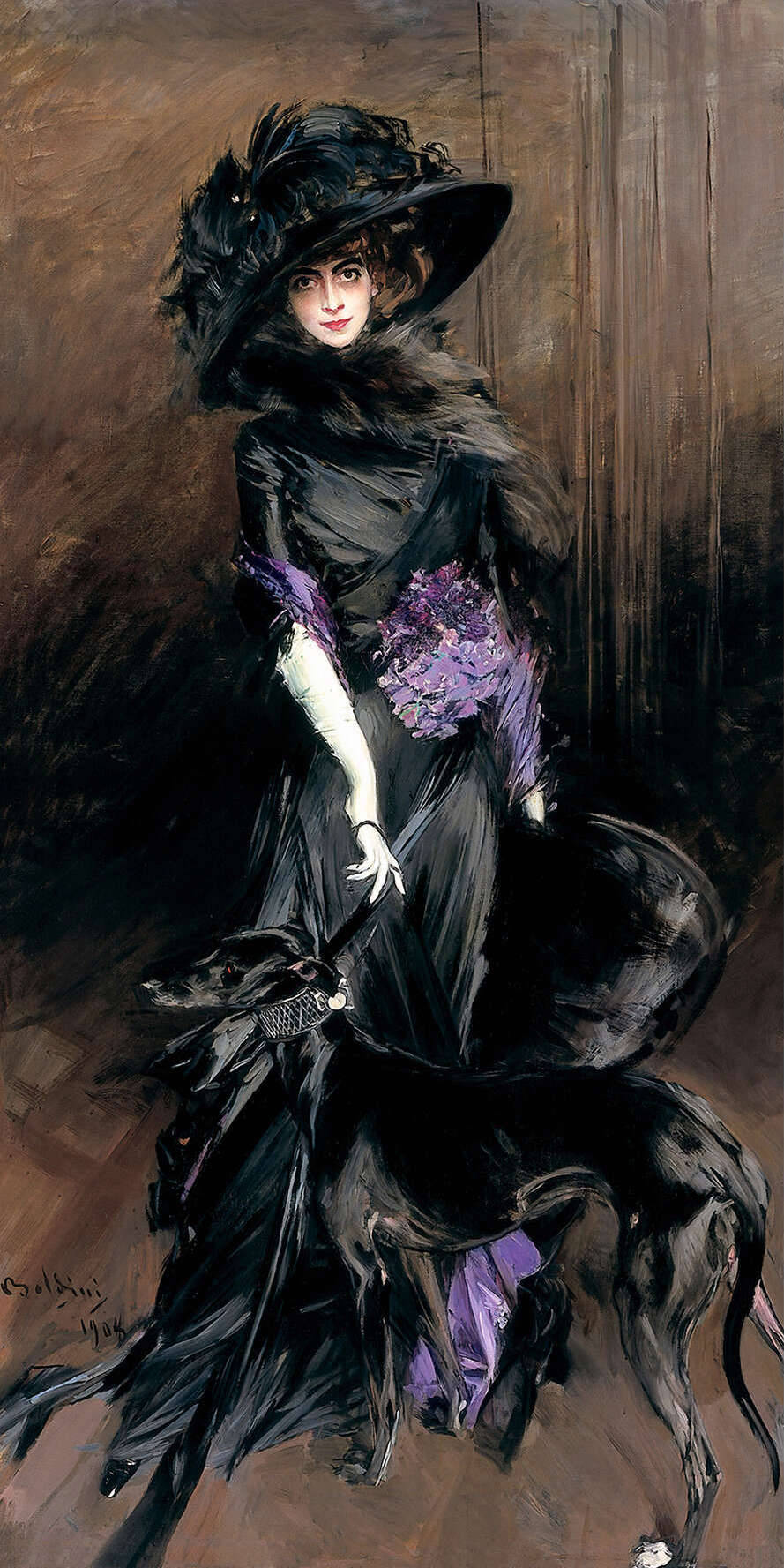
#luisa casati#marchesa casati#muse#patroness#Luisa Amman#socialite#art#painting#giovanni boldini#luisa#1900s#1908
39 notes
·
View notes
Text
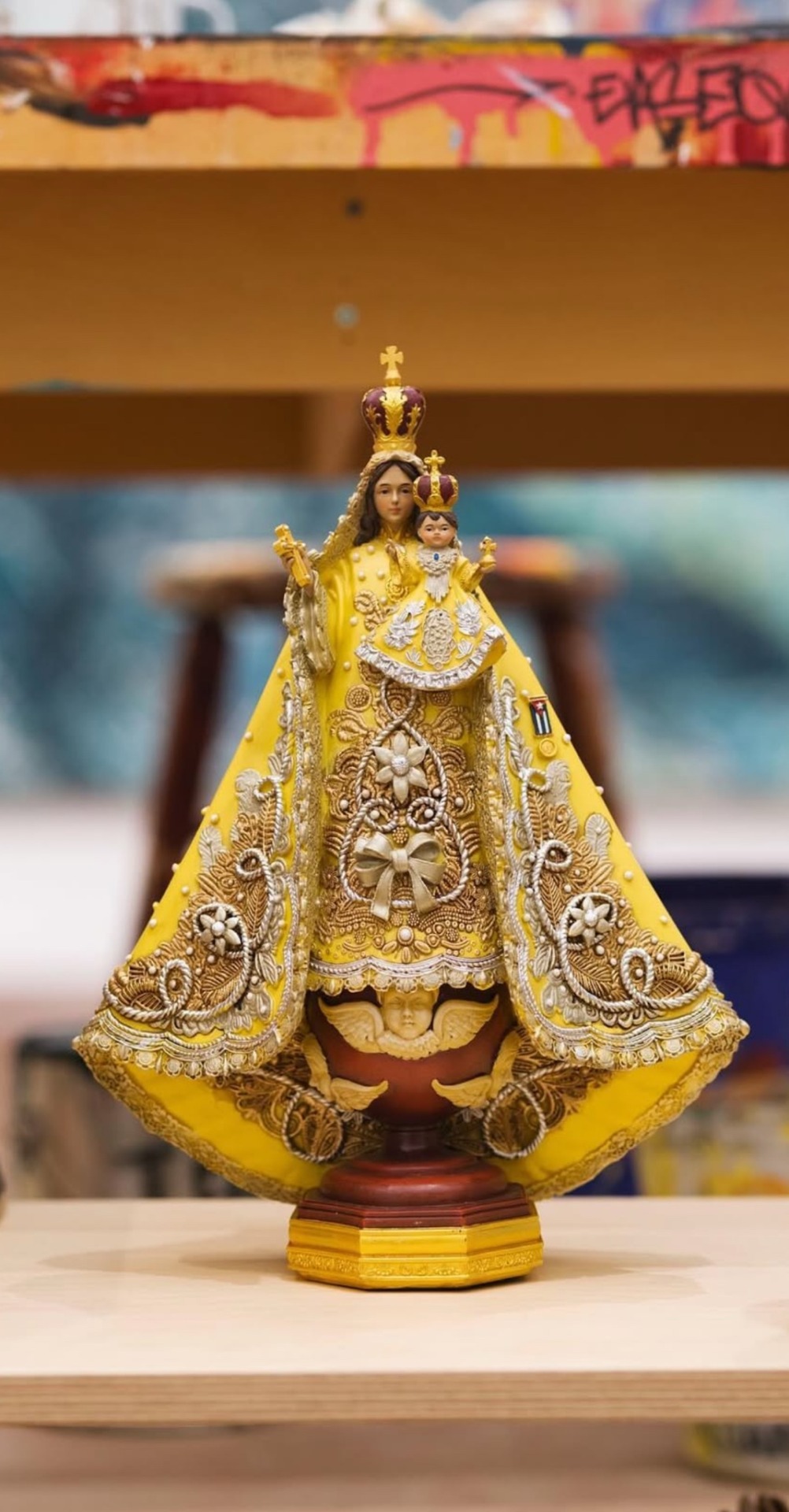
Our Lady of Charity, Patroness of Cuba ❤️ pray for us
this photo is of a Marian statue that was part of a Jose Parla exhibition currently on display at the Pérez Art Museum Miami
7 notes
·
View notes
Text
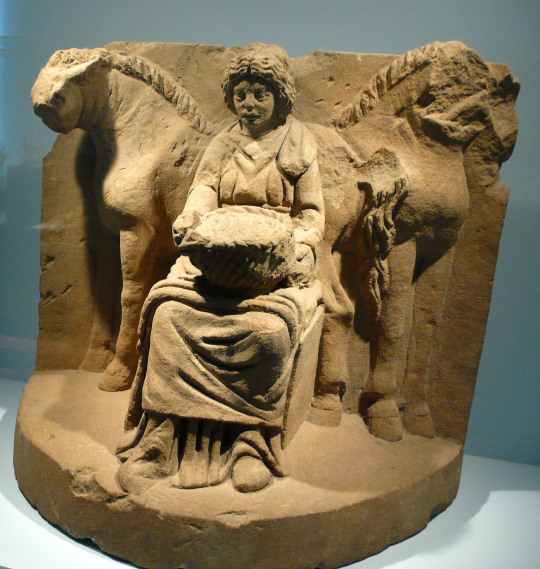
Epona, ca. 200 AD
The motif of the "Lady of the Animals" lives on this religious depiction. Flanked by two horses, Epona is shown sitting on a throne holding a fruit basket on her lap. The Celtic goddess was revered as the patroness for wagoners. She was also popular among the military. The images was mainly occurred in the provinces of Gaul and Germania.
Kunst der Kelten, Historisches Museum Bern. Art of the Celts, Historic Museum of Bern
78 notes
·
View notes
Text
author's note ; a terribly trivial trope with gods!au but i still like this idea. my first attempt to write for jjk so be nice... please?🙏🏻🙂↕️🙂↕️
pairing ; god of war!Sukuna x goddess of love!reader
tw ; suggestive, possessive, mentions of blood, Sukuna himself is a trigger warning.
first art credit to ryoza on X, third unfortunately i don’t know, i just took it from pinterest, if u know the artist let me know.
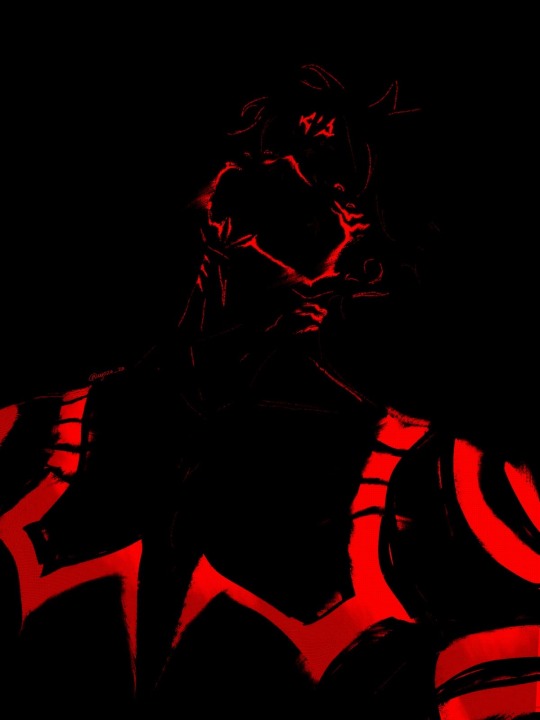
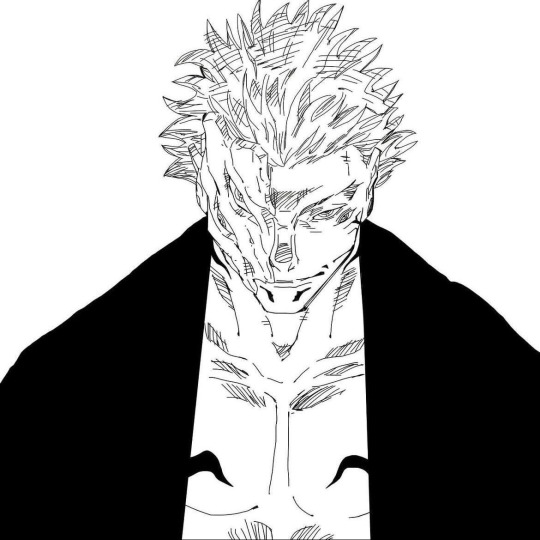
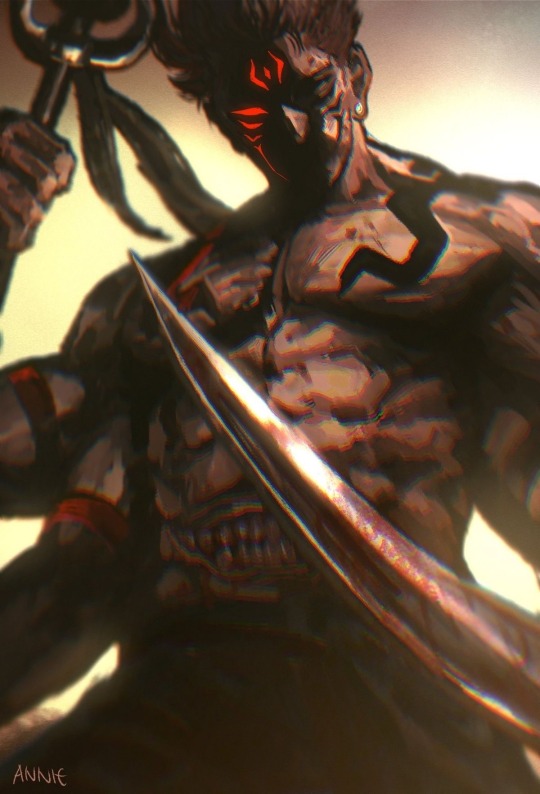
the world outside your temple is dying.
you feel every heartbeat snuffed out like a candle in the wind, every soul extinguished under the weight of Sukuna’s brutal assault. the prayers of your people grow weaker with each passing moment, their pleas mixing with the acrid smoke rising from your city. a city, your sacred haven, you swore to protect, everything has fallen. as the goddess of Love you can do nothing but listen as your people are slaughtered by the god of War, Sukuna, and his vicious army.
yet here you stand, in your temple of marble and gold, powerless against the force that rages just beyond its doors.
then, a low groan of ancient stone pulls your attention. the great doors shudder before they’re forced open, and the breath catches in your throat. he has come.
the god of War strides into your sanctuary, and with him, the violence of the outside world bleeds into your sanctuary. his presence alone warps the very air, thickening it with malice and death. you feel it immediately — the oppressive weight of his aura, so unlike your own. it’s as if the divine purity within you is recoiling, trying to retreat from the darkness he carries with him.
he is the storm to your calm, a god forged in battle and blood, and it feels like the very walls of your temple groan under the strain of holding him. his aura is suffocating, a constant pulse of violent energy that seeps into every corner, every crevice of the sacred space, corrupting it just by being there.
delicate floral incense that used to fill your temple is swallowed by the acrid stench of blood. the faint scent of burning flesh seems to follow him, clinging to his skin and weapon. it turns your stomach, and yet all you can do is back away.
his eyes — deep red, smoldering like embers — lock onto yours with a dark amusement, the corners of his mouth lifting into a cruel grin. where you embody love and gentleness, everything about him is violence and possession. there is nothing in his gaze, but only burning hunger.
you stand before him in white, light robes, the embodiment of purity itself, but his mere presence in your temple feels like a violation, like he burning your delicate skin with his dirty, bloody hands. you can feel the sacred energy of the space twisting, recoiling from him. soft tapestries that once shimmered in the glow of the candles seem to sag as if under the weight of his power. the statues of you that line the walls — once symbols of hope for your people — seem to dim, the light in their eyes snuffed out by the God of War's corruption.
Sukuna takes a step forward, and his shadow seems to stretch across the entire hall, swallowing the light. aach step echoes like a death knell, the sound of his boots on marble a cruel reminder that he has defiled everything that was once pure. his bloodied hands drag across the white stone altar, leaving streaks of crimson on the sacred surface. It’s a deliberate act of desecration — he wants you to feel it. wants you to know that nothing here is untouched by his violence.
“you’ve built a lovely sanctuary,” he muses, voice low and mocking. “so pure. so fragile.” his eyes gleam, sharp as blades. “but like everything else you’ve created, it will fall. just like your people. just like you.”
the divine power that fills your veins feels cold now, diminished in his overwhelming presence. you, the patroness of love and purity, can do nothing to stop the wave of blood and death he brings with him.
his aura presses down on you, crushing and suffocating, smothering the breath from your lungs. it’s like standing before a predator who takes his time savoring the moment before the kill.
“look at you,” he sneers, stepping closer, his voice a twisted mockery of gentleness. “all of this love… yet you reek of weakness.”
your hands tremble at your sides, fingers curling into the fabric of your robes as if it could somehow anchor you to this space, to the divine essence that has protected you for so long. but even that protection feels fragile now, brittle under his relentless gaze. his eyes burn into you, full of something darker, more twisted — obsession.
you can feel it, his claim sinking into the very fibers of your being. Sukuna is not here to simply conquer. he has razed cities, destroyed armies — but you, you are the prize that he truly desires. his fixation on this idea, thick in the air, and it terrifies you.
“do you feel it?” his breath is hot against your skin now, his body towering over yours, radiating raw power. his voice is soft, almost intimate, as he leans in, his lips brushing the shell of your ear. “you can’t escape me, Goddess. this temple, your city, your people… they were nothing more than a prelude.”
his fingers, stained with the blood of your followers, trace along the line of your jaw, leaving a smear of red on your pale skin. touch burns like fire, sending a violent shudder through your body.
Sukuna’s grin widens, sensing your fear, your hopelessness. “you were never meant to be untouchable,” he whispers darkly. “not from me. you, with all your love, purity and light… it was always meant to be broken.”
“be broken by me,” he continue, hissing venomously into your ear, voice thick with satisfaction…
#[ ~ koi.talks🗣]#jjk x reader#jjk#jjk smut#jjk au#yandere jjk x reader#jujutsu sukuna#jujutsu kaisen#jujustsu kaisen x reader#x reader#sukuna#sukuna ryomen#sukuna ryoumen smut
179 notes
·
View notes
Text
and, of course, Lucifer's wives' quattuorvirat 🌿

empress, patroness of arts, warlady, high priestess
Charlie's gang height chart
overlords' height chart
Heaven's height chart
Sins' height chart
#hazbin hotel#hazbin hotel: asileverse au#hazbin hotel au#asileverse#lilith morningstar#lilith#lilith redesign#hazbin hotel lilith#lucifer's wives#hazbin hotel lucifer's wives#hazbin hotel rewrite#hazbin hotel redesign#hazbin hotel critical
65 notes
·
View notes
Text
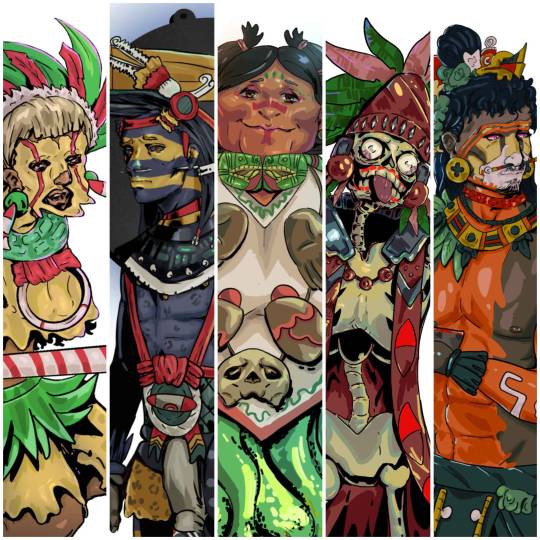
The Aztec Pantheon drawn in Hades style.

Cōātlīcue
Cōātlīcue, or "She who wears skirts made of snakes" is the mother Goddess of fertility, patroness of life and death, and rebirth. She is said to birth the stars known by the Mexica as the Centzonhuītznāhua, the moon goddess Coyolxāuhqui, and the Aztec sun god Huītzilōpōchtli.

Tezcatlipoca
Tezcatlipoca is the Aztec God of the Night, Storms, and Obsidian. He wields his Obsidian Mirror (his name meaning Smoking Mirror) and is the 'Tezcatlipoca' (A title for the Four Central Gods of Aztec Culture) of the North. He is said to have a youthful appearance with skin dark like obsidian and yellow striped paint across his face. His rival is Quetzalcōātl, the Tezcatlipoca of the West and fellow Creator God.

Mictlantecutli
Mictlāntēcutli is the Aztec God of the underworld. Like Hades, who styles his realm after himself, Mictlāntēcutli is known as the Lord of Mictlān and is associated with death, decay and ritual cannibalism. As Tōnatiuh, the God of the Sun is associated with light, Mictlāntēcutli is associated with darkness, with animals like Owls, Bats, and Spiders being attributed to him. As an antagonist in the Tale of Creation, Mictlāntēcutli was a major obstacle against Quetzalcōātl who escaped the underworld with bones he used to create the first humans.

Xipe Totec
Xipe Totec is the Aztec God of Flayed Rebirth, Spring, and Agriculture (among many other aspects). He was said to have flayed his own fetid skin to make way for a new body, like the changing seasons, and the way maize (corn) lose their layers. As one of the Four Tezcatlipocas (the others being Quetzalcoatl (Feathered Serpent), Huitzilopochtli (Left-Handed Hummingbird) and Tezcatlipoca (Smoking Mirror) himself) Xipe Totec (Our Lord the Flayed One) claims dominion over the East.

Xochipilli
Xōchipilli is the Aztec god of art, music, poetry, flowers, and games. Similar to the Greek God Dionysus, Xōchipilli (Flower Prince) is associated with celebration and a bit of debauchery. Various psychoactive plants including Tobacco, mushrooms, and a variety of psychedelic flowers are taken during his festivals or in prayer to him. Xōchipilli is also associated with male sex work and homosexuality. His female counterpart/sister is Xōchiquetzal, who has a similar portfolio, and was associated with love beauty and fertility.
#hades fanart#hades game#hades supergiant#artists on tumblr#digital art#hades#hades 2#supergiant hades#hades art#oc art
136 notes
·
View notes
Text

So happy to finally share my piece for the @hwsfemmephenomenon zine!! It's a lovely zine full of passionate and talented artists, so I highly encourage you to check it out <3 My piece is of Monaco in the late 1900s-early 1910s, in the role of patroness to the arts... especially the Ballets Russes, who used the Monte Carlo as their workshop space even before the creation of the Ballets Russes of Monte Carlo in the 30s. If you squint you can see some Rite of Spring cameos in there haha
62 notes
·
View notes
Note
Patro the moose with huge antlers

95 notes
·
View notes
Text
AMPHOREUS LORE - AGLAEA ANALYSIS
So, I think everyone saw it, but we were graced today with the drip marketing for Aglaea, a 5-Star Lightning unit on the brand new Remembrance Path. Hence the reason why I’m back from the dead, in order to dissect and analyze everything I can about this sliver of lore we were given.
1. Who is Aglaea in Greek Mythology ?
Aglaea (Ἀγλαΐα) can be translated to “splendor”, “radiance”. It is the name of the youngest of the Charites or Graces, minor goddesses said to be patronesses of amusement and festivities, presiding over things such as grace, beauty, adornment, mirth, banquet, rest, happiness, relaxation etc. Although there are many names associated with the Charites, it is customary to recognize three main ones : Aglaea (Splendor, Beauty and Adornment), Euphrosyne (Cheer, Mirth, Merriment and Joy) and Thalia (Abundance, Festivities and Banquets).
The Charites also served as attendants for Hera and Aphrodite, Homer specifically associating them to the retinue of Aphrodite. There are also mentions of their involvement with the Underworld and the Eleusinian Mysteries (secret rites for Persephone and Demeter), although exact sources on this specific part are lacking. I’m still keeping it however, for some specific reasons.
They were said to be the daughters of Zeus and Eurynome, one of the elder Okeanides. However, according to the Orphic Hymns, their mother would rather be Eunomia, the goddess of good order and lawful conduct. Their godly father being Zeus, it could explain why Hoyoverse chose to make Aglaea a Lightning unit.
Another interesting fact is that Aglaea is sometimes equated with Charis and according to Hesiod’s Theogony, this would make her Hephaestus’ wife, following his divorce with Aphrodite. This is interesting for one specific reason : the automatons surrounding her in her drip marketing. Hephaestus was the Olympian god of fire, smiths, craftsmen and metalworking and some of his greatest achievements were the Automatones, animated metal statues of animal, men and monsters. Among these Automatons, we find the Kourai Khryseai (Golden Maidens) : woman-shaped, gold automatons serving as attendants for his palace.
2. What can we guess from her titles ?
In the drip marketing post, we were offered a gaggle of titles : Dressmaster of Okhema, Chrysos Heir, Weaver of Gold, Goldweaver, bearer of the Coreflame of Romance… Although they may seem a little obscure, they actually refer to quite a number of things.
Chrysos (χρῡσός) means “gold”, or in a more poetic sense, “something dear and precious”. However, it’s more the “gold” aspect which will interest us, notably because of Aglaea’s character design which is covered in it. Gold was primarily associated with deities, symbolizing power, authority, wealth and eternal life (think about the golden apples of the Hesperides).
This brings us to the title “Goldweaver”, which is also fascinating. In Greek Mythology, one of the well-known weaving myth is about the Moirai, the three sisters personifying destiny and weaving the fate of every being in existence. Being the weaver, Aglaea would be equated to Clotho, the Moirai responsible for spinning the thread, responsible for choosing when a person was born as well as when deities or mortals were to be saved or put to death, being able to resurrect people of her choosing (for example Pelops, Tantalus’ son).
However, another weaving myth is preponderant in Greek mythology : Arachne and Athena weaving contest, a long known cautionary tale about the consequences of hubris in the face of the divine. Athena and Hephaestus were considered as the great patrons both of the useful and elegant arts, as Athena was also the goddess of crafts such as pottery and weaving. Aglaea’s title as “Dressmaker” could be a reference to this, and more particularly to the Arrephoros, girl acolytes in the cult of Athena Polias, responsible for supervising the weaving of the peplos used during the Panathenaea. Or it could also be a reference to the Charites’ role as Aphrodite’s attendants, as Homer mentioned they were the one to weave and dye her peplos.
Finally, Coreflame of Romance would have been the most obscure title, if not for all the previous explanations about the Charites’ association with Aphrodite. According to the Dionysiaca, there was once a time when Aphrodite attempted to weave better than Athena out of jealousy, aided in her endeavor by the Charites, Aglaea being the one passing her the yarn.
3. What about Okhema and Amphoreus ?
Okhema is here referenced to be a city, but we already met that word, in a slightly different form : “Regret of Infinite Ochema”, the Trace material given by Phantylia. An Okhema (ὄχημα) is a carrier/vehicle for the soul in Neoplatonism. It is particularly important in Plato’s Myth of Er, where the main character recount his journey in the afterlife, including an account of reincarnation and the celestial spheres of the astral plane. A city named Okhema could imply either the “vehicle” aspect of the okhema, maybe being a moving city…. or since an okhema could be thought as a recipient for a soul, that the city itself could play a role in anchoring the souls of its inhabitants or allowing their travels/transport from one point/place/state to another.
We’ve got another thing about Okhema, the part “holy city kissed by dawn”. Many places could be considered “holy” in greek mythology. One of them is Elefsina, known as Eleusis and holy site of the Eleusinian Mysteries mentioned earlier alongside Delphi, where is kept the omphalos (the chinese name for Amphoreus is the word omphalos). However, the “kissed by dawn” was more interesting, as Greek mythology have a personification of the dawn in the goddess Eos, often equated with Hemera. Eos’ myths are heavily connected to Aphrodite, in addition to her being the mother of the Anemoi, the greek gods of the winds and in the post, Aglaea said “the wind brought me news of you”.
About Amphoreus… we know next to nothing about it, except its moniker “The Eternal Land” and that it is “hidden away from outside observation, its presence only revealed by the light from the mirror of the Garden of Recollection” according to Black Swan. It was also mentioned that it was “fettered by three Paths” and given the involvement of the Garden, it seems safe to bet on Remembrance being one of them. I think Amphoreus could honestly be a place filled to the brim with memoria, if not entirely dreamscape-like, similarly to Penacony’s Dreamscape.
Amphoreus reference the amphora, a container used for the storage and transportation of various goods such as wine and oil, in addition to being a common support for vase painting. One interesting thing is that painted amphoras were often used for funerary purposes, as graves markers or recipients for funeral offerings or human remains. Which is even more interesting considering that the post mentioned “the dying land of Amphoreus”, which leads me to think that one of the three Paths fettering Amphoreus might be Finality.
As for why it’s dying, the answer is quite explicit when you know your mythology : “they will smite down the gods, return the divine fire”. This is Prometheus myth, and if we have Prometheus myth, we have Pandora’s Box in tow. And tell me, what is a pithos if not a massive amphora ? In Prometheus’ myth, the gods didn’t take back the gift of fire, but what if they did in Amphoreus ? In addition to letting their Pandora release the curses of death, sickness and all other various evils to plague humankind ?
The idea of Remembrance and Finality being two of the three Paths in Amphoreus is even more endorsed by the mention of granting rebirth. We know that Fuli’s realm “Eden of Blessed Insight” also known as the Pure Land of Recollection, serves to store memories that “shall serve to reshape the entirety of the world after its annihilation”. It’s basically backup data in case of inevitable doom, in order to recreate the universe as it once was. Aglaea having a “Mnestia” as Divine Authority is also adding to it, as Mnestia more than probably comes from “mnestic”, meaning “pertaining to memory”.
That’s one of the reason why I kept the information about the Charites being linked to the Underworld and the Eleusinian Mysteries, between the funerary amphoras, the okhema and Myth of Er and now that, it seems important enough to keep track of any references to death and rebirth. The aforementioned “Chrysalis” is also counting in said references, as it’s a common symbol for death and rebirth by metamorphosis/transformation.
I have another theory to talk about, but this is already long enough I fear.
#hsr#honkai star rail#hsr analysis#hsr theory#hsr lore#hsr aglaea#aglaea#aglaea hsr#hsr amphoreus#amphoreus hsr#hsr 3.0
89 notes
·
View notes
Text
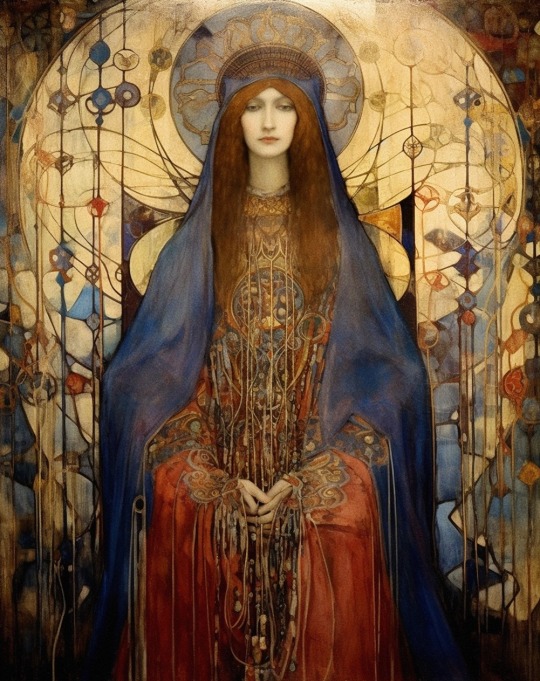
Brigit - Druid Goddess Talon Abraxas
Brigit is a ‘pan Celtic’ goddess, who was worshipped by both the Goidelic and Brythonic Celts in the British Isles and beyond. She is a solar deity, who once hung her mantle on a sunbeam. In Celtic mythology, Brigit is the daughter of the Morrighan and the Dagda, the Good God and Chief of the Tuatha de Danaan, the ancient fairy race of Ireland, and the sister of Ogma, who invented the Ogham alphabet. She was the wife of Bres, King of the Fomorians (who were at war with the Tuatha de Danaan). Brigit was said to have been the mediator of peace between the two ancient warring tribes. She was the mother of the Three Gods of Danu – Ruadan, Iuchar and Uar. These three Gods were said to have married the three princesses of Ireland – Eire, Fodhla and Banbha. In other sources, Brigid is the daughter of Boann, the Goddess of the River Boyne in Ireland. Boann (bo fhionn) means ‘white cow’, an association she shares with Brigid. Brigit is primarily the patron Goddess of poets, healers and smiths. She is also a patron of other womanly arts – midwifery, dyeing, weaving and brewing, and the guardian of children and farm animals – particularly cows. The island of Ireland itself is said to be the green mantle of Brigit. She is also said to be the patron of travellers, sailors, and fugitives. She is specifically a patroness to the Druids in her aspects of poetry (Bards), healing and prophecy (Ovates) and blacksmithing (Druids).
43 notes
·
View notes
Text
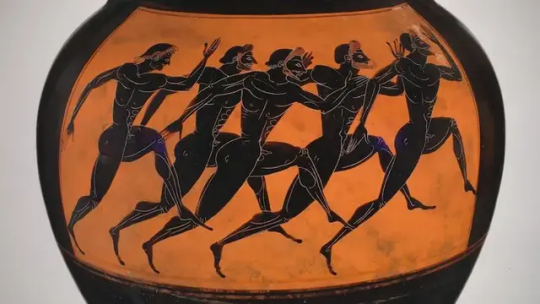
Panathenaic Prize Amphora: A Pot With Olive Oil Awarded at The Ancient Greek Olympics
Instead of a gold medal, victors at the ancient Greek Panathenaic Games received terra-cotta pots filled with Athenian olive oil from sacred trees.
Name: Panathenaic prize amphora.
What it is: A Greek terra-cotta pot known as an amphora.
Where it is from: Vulci, Italy.
When it was made: Circa 530 B.C., during Greece's Archaic period.
Unlike in today's Olympics — in which competitors receive gold, silver and bronze medals — each ancient winner received dozens of terra-cotta vases emblazoned with their specific sport and filled with Athenian olive oil, a highly "valuable prize," according to Harvard Art Museums.
The olive oil award given to Olympic champions came from the sacred groves of Athena, the patroness of Athens, according to the Metropolitan Museum of Art in New York City. In general, ancient Greeks considered olive trees "sacred," and they symbolized Zeus, the god of the sky and, later, the god of the Olympics, according to the Journal of Olympic History.
his particular amphora features a lineup of five runners during a footrace, a competition considered the "earliest known event in the Panathenaic Games," according to the Met. Athletes competed fully naked, since they thought their physiques might intimidate their competition, according to Southern Utah University.
The pot, which stands 24.5 inches (62 centimeters) tall, is attributed to "Euphiletos Painter." This anonymous artist was known for an art style called black-figure pottery, in which subjects were drawn in silhouette, according to the British Museum. This is just one of the many vases awarded to the victors at the Games, with other pots featuring charioteers, archers and boxers.
By Jennifer Nalewicki.
#Panathenaic Prize Amphora: A Pot With Olive Oil Awarded at The Ancient Greek Olympics#olympics#ancient greek olympics#amphora#terra-cotta#terra-cotta pot#athenian olive oil#sacred olive oil#ancient artifacts#archeology#archeolgst#history#history news#ancient history#ancient culture#ancient civilizations#ancient greece#greek history#greek art#ancient art
74 notes
·
View notes
Text
A Litany to Ashtoreth/Astarte
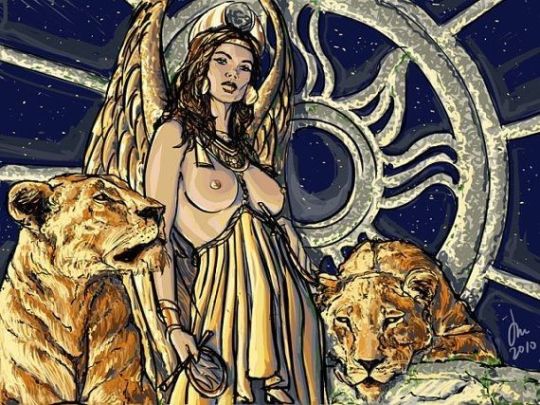
Hear my prayer, oh Astarte. Lady of the Moon, Of the Heavens, Of the Earth. Beloved Goddess, Ashtoreth, of the lineages of Inanna-Ishtar and Asherah!
Listen unto my words. Know, Ashtoreth, that I love you. Know that I see you in the pantheons of the world. Know that I see your divinity everywhere, in all goddesses.
I know you, Astarte, by many forms! I know you as Artemis, beloved of the Ephesians! I know you as Diana, beautiful one of Lake Nemi! I know you as Hekate, the key-keeper! I know you as Aphrodite, who bestows passion in lovers! I know you as Athena, ever-granting wisdom! I know you as Babalon, who holds the chalice of the blood of life! I know you as Andraste, lady of Ravens and Wolves! I know you as Astaroth, Dutchess of the Infernal Realms! I know you as Aradia, First of Witches! I know you as Gaia, Mother Earth Herself! I know you as Nyx, Nott, Nuit, Veil of Night! I know you as Isis, Goddess of 10,000 Names! I know you as Hathor, Qetesh, Lady of Sacred Pleasures! I know you as Freyja, Valkyrie Queen! I know you in all pantheons, in all names, in all goddesses! Likewise, I know you as Tanith of Carthage! I see how you have become beloved in all nations! I see how your evolutionary line across cultures is interwoven! I see how you are in all goddesses! I see how your essence ever thrives! Oh Ashtoreth, Astarte, I love you in all forms, in all names! I love you, for you teach the art of sacred syncretism! I love seeing how your essence permeates and shifts between pantheons. I love seeing your endless manifestations! I love seeing your beauty! Astarte, my Lady of the Moon, my Lady of Life, of the Vines and of the Trees! Astarte, my Lady of the Witches' Craft! Astarte, Patroness of the Queer! Astarte, my Lady of Undying Worship! Astarte, Ashtoreth! Look upon my litany, hear my words of reverence, and know that I love you! Know that you are within me, and I am of you! Know that I feel your blessings! Ave Astarte, Ashtoreth! Great Goddess Divine!
38 notes
·
View notes
Text
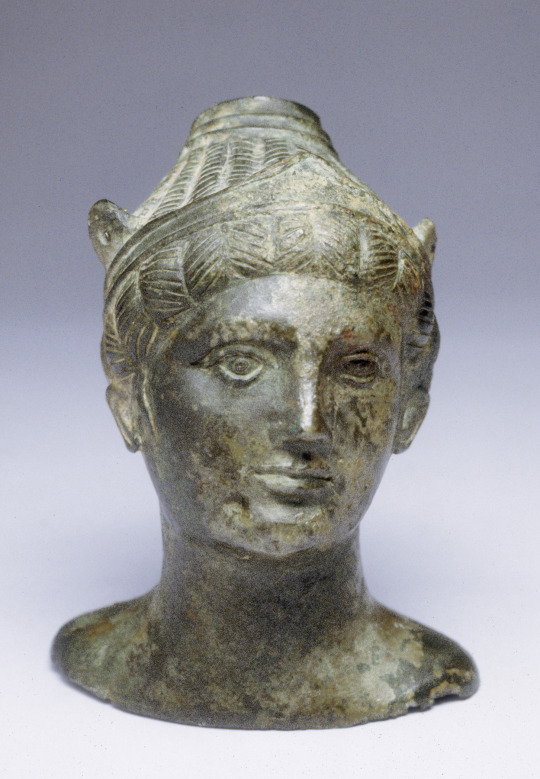
Bronze balsamarium (container for oil or perfume), made in Etruria in the first half of the 3rd century BCE. The balsamarium takes the form of a deity with a winged helmet, variously identified as 1) Turan, goddess of love, fertility, and sexual potency, identified with Aphrodite/Venus and patroness of the Etruscan city of Velch (=Vulci), or 2) one of the Lasas, deities who made up Turan's entourage, possibly connected to the Roman Lares (household gods). Height = 10.8 cm/4.2 in. Now in the Walters Art Museum, Baltimore. Photo credit: Walters Art Museum.
#classics#tagamemnon#Etruria#Etruscan#artifact#artifacts#art#art history#ancient art#Etruscan art#Etruscan religion#sculpture#metalwork#bronzework#balsamarium#Hellenistic period#Walters Art Museum
152 notes
·
View notes
Text
More oc art, illes (top) and patro (bottom) the reincarnations of Achilles and Patrocolus
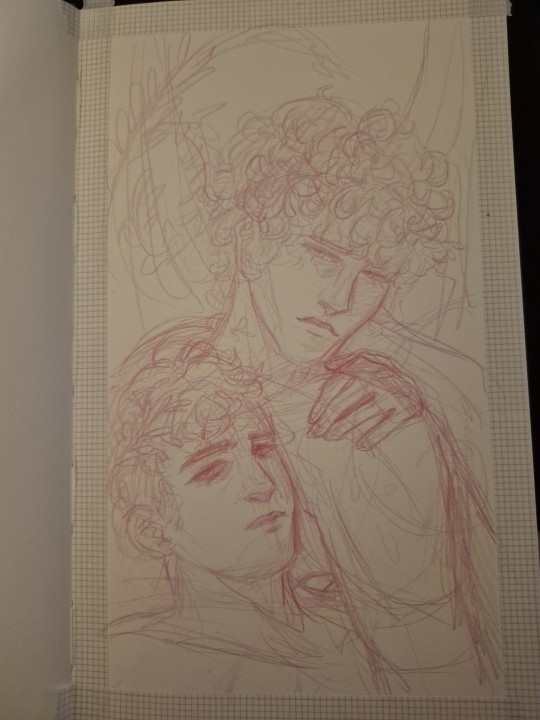
#ocs#artists on tumblr#my ocs#oc artwork#original art#original character#oc#oc art#traditional sketch#sketch#traditional illustration#traditional drawing#traditional art#drawing#art#my art#artwork#reincarnation#achilles#achillian#patroclus#patrochilles
22 notes
·
View notes